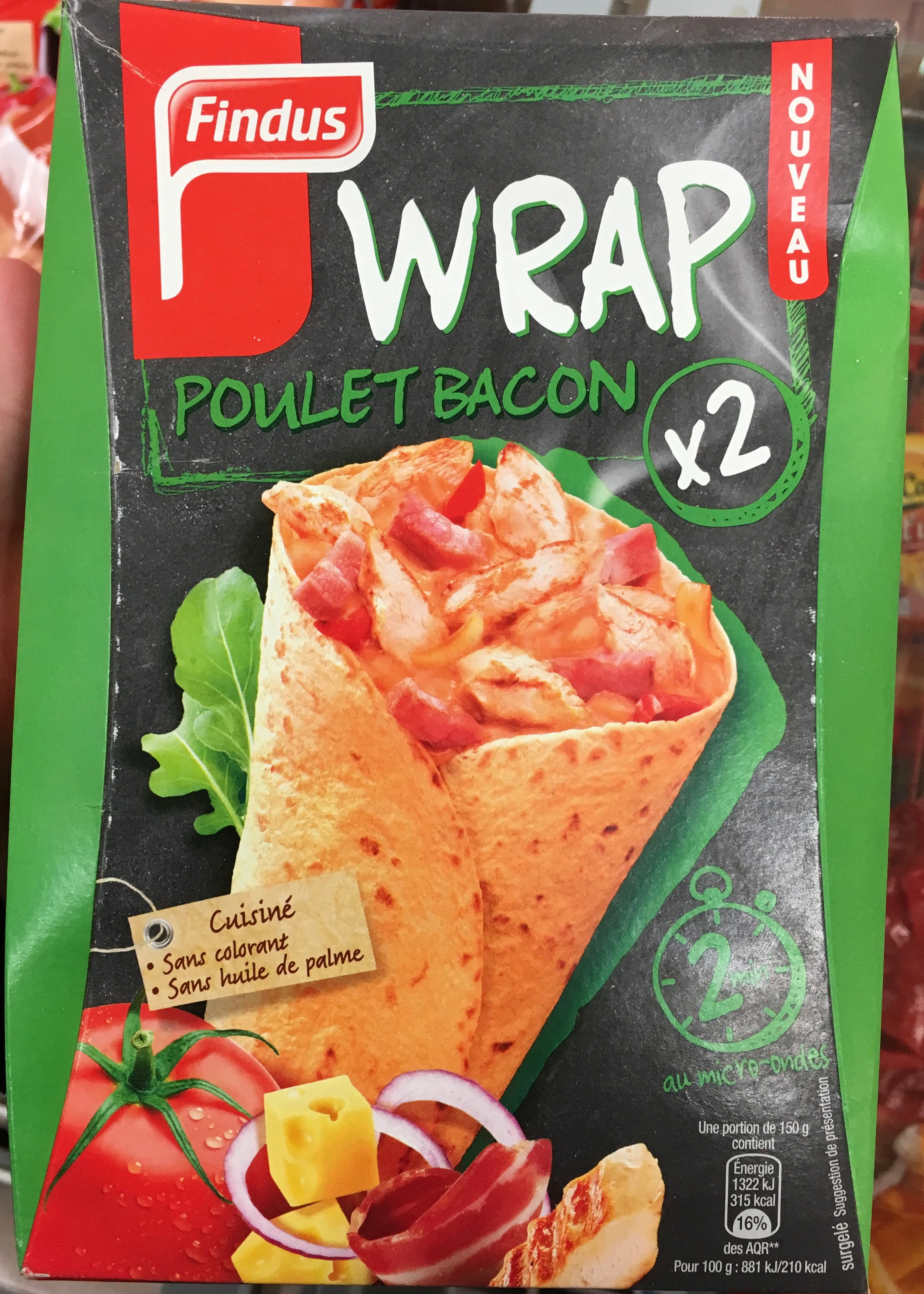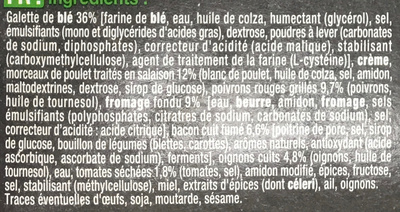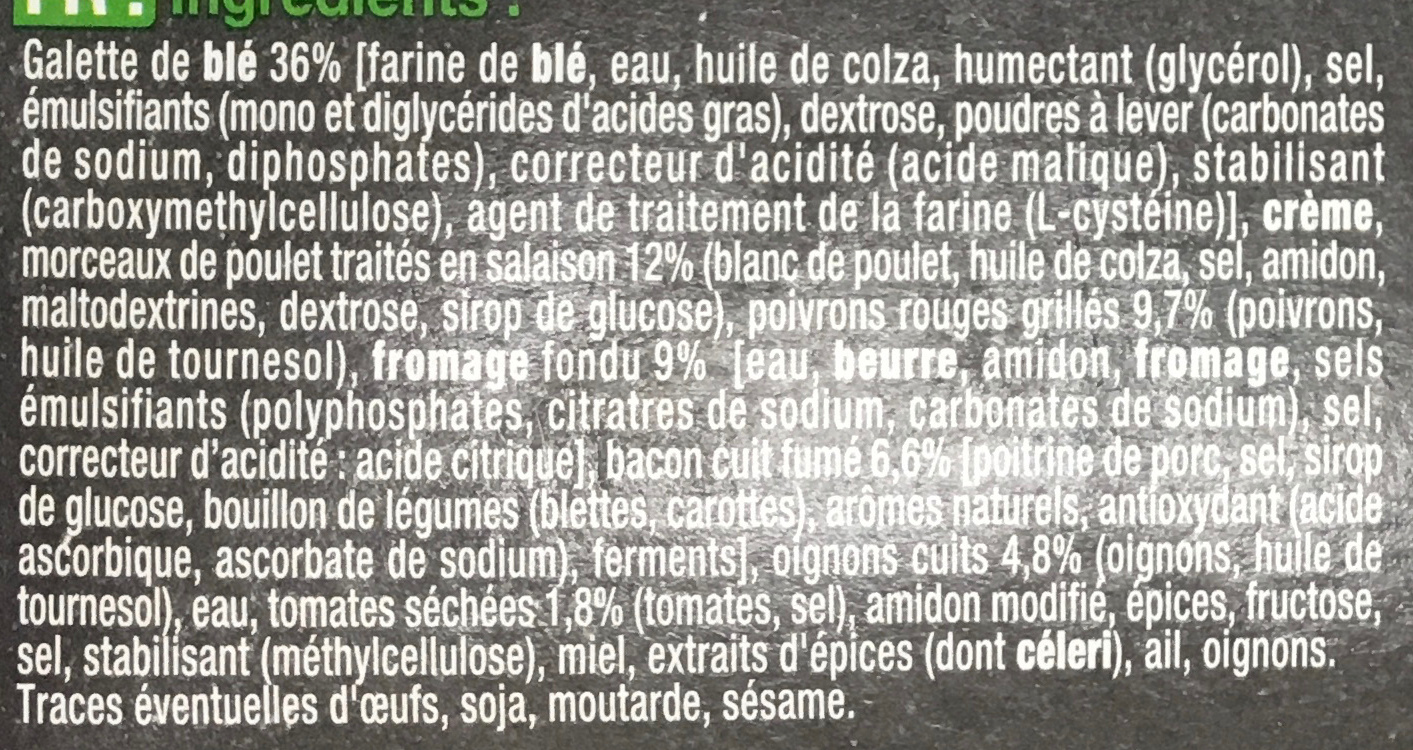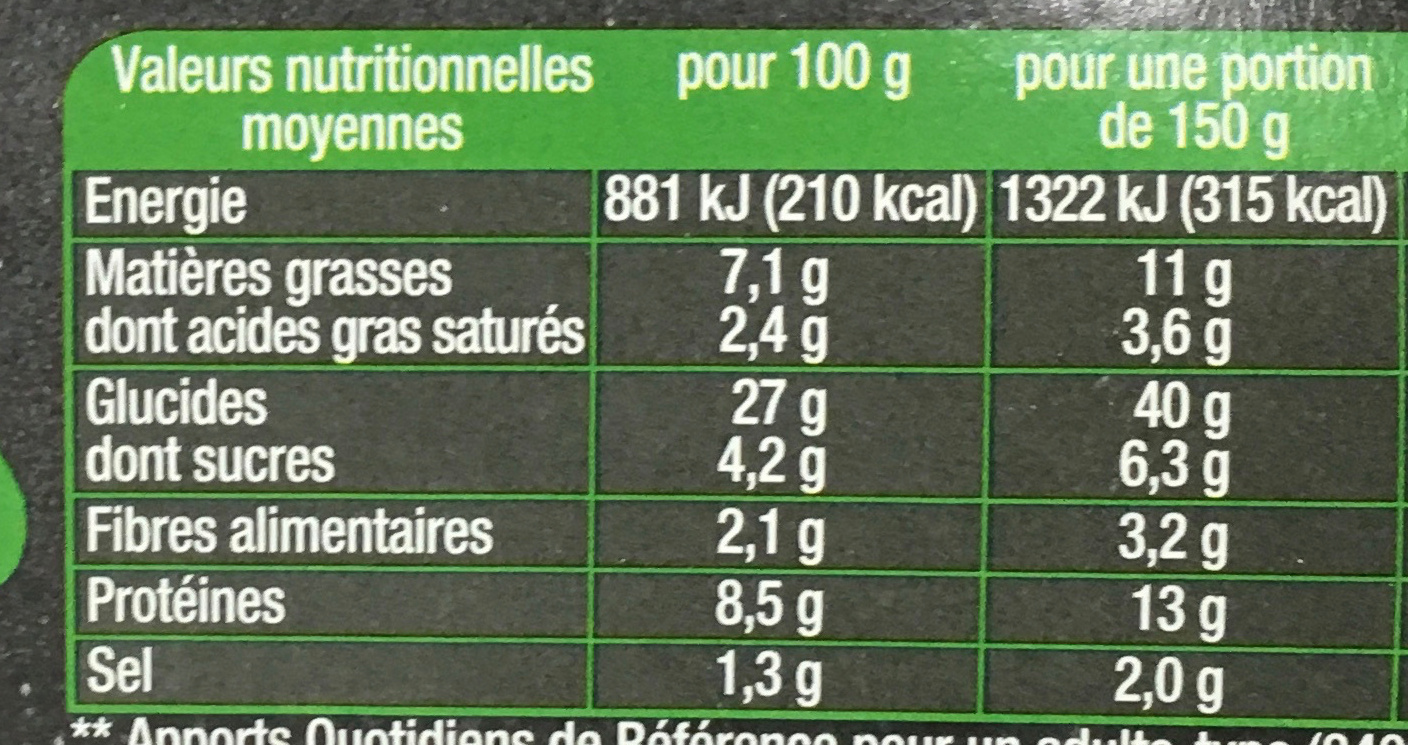Help us make food transparency the norm!
As a non-profit organization, we depend on your donations to continue informing consumers around the world about what they eat.
The food revolution starts with you!
Wrap Poulet Bacon - Findus - 2 * 150 g (300 g)
Wrap Poulet Bacon - Findus - 2 * 150 g (300 g)
This product page is not complete. You can help to complete it by editing it and adding more data from the photos we have, or by taking more photos using the app for Android or iPhone/iPad. Thank you!
×
Barcode: 3599740009765 (EAN / EAN-13)
Common name: Galettes de blé garnies de morceaux de poulet traités en salaison, fromage fondu, bacon cuit fumé, oignons cuits et tomates séchées, surgelées
Quantity: 2 * 150 g (300 g)
Brands: Findus
Categories: Frozen foods, Sandwiches, Wraps, Frozen snacks and starters
Labels, certifications, awards: No colorings, No palm oil
Traceability code: DE MW 22001 EG
Countries where sold: France
Matching with your preferences
Health
Ingredients
-
73 ingredients
: Galette de blé 36 % [farine de blé, eau, huile de colza, humectant (glycérol), sel, émulsifiants (mono et diglycérides d'acides gras), dextrose, poudres à lever (carbonates de sodium, diphosphates), correcteur d'acidité (acide malique), stabilisant (carboxyméthylcellulose), agent de de traitement de la farine (L-cystéine)], crème, morceaux de poulet traités en salaison 12 % (blanc de poulet, huile de colza, sel, amidon, maltodextrines, dextrose, sirop de glucose), poivrons rouges grillés 9,7 % (poivrons, huile de tournesol), fromage fondu 9 % [eau, beurre, amidon, fromage, sels émulsifiants (polyphosphates, citrates de sodium, carbonates de sodium), sel, correcteur d'acidité : acide citrique], bacon cuit fumé 6,6 % [poitrine de porc, sel, sirop de glucose, bouillon de légumes (blettes, carottes), arômes naturels, antioxydant (acide ascorbique, ascorbate de sodium), ferments], oignons cuits 4,8 % (oignons, huile de tournesol), eau, tomates séchées 1,8 % (tomates, sel), amidon modifié, épices, fructose, sel, stabilisant (méthylcellulose), miel, extraits d'épices (dont céleri), ail, oignons.Allergens: Celery, Gluten, MilkTraces: Eggs, Mustard, Sesame seeds, Soybeans
Food processing
-
Ultra processed foods
Elements that indicate the product is in the 4 - Ultra processed food and drink products group:
- Additive: E14XX - Modified Starch
- Additive: E422 - Glycerol
- Additive: E450 - Diphosphates
- Additive: E452 - Polyphosphates
- Additive: E461 - Methyl cellulose
- Additive: E466 - Sodium carboxy methyl cellulose
- Additive: E471 - Mono- and diglycerides of fatty acids
- Ingredient: Dextrose
- Ingredient: Emulsifier
- Ingredient: Flavouring
- Ingredient: Glucose
- Ingredient: Glucose syrup
- Ingredient: Humectant
- Ingredient: Maltodextrin
Food products are classified into 4 groups according to their degree of processing:
- Unprocessed or minimally processed foods
- Processed culinary ingredients
- Processed foods
- Ultra processed foods
The determination of the group is based on the category of the product and on the ingredients it contains.
Additives
-
E296 - Malic acid
Malic acid: Malic acid is an organic compound with the molecular formula C4H6O5. It is a dicarboxylic acid that is made by all living organisms, contributes to the pleasantly sour taste of fruits, and is used as a food additive. Malic acid has two stereoisomeric forms -L- and D-enantiomers-, though only the L-isomer exists naturally. The salts and esters of malic acid are known as malates. The malate anion is an intermediate in the citric acid cycle.Source: Wikipedia
-
E301 - Sodium ascorbate
Sodium ascorbate: Sodium ascorbate is one of a number of mineral salts of ascorbic acid -vitamin C-. The molecular formula of this chemical compound is C6H7NaO6. As the sodium salt of ascorbic acid, it is known as a mineral ascorbate. It has not been demonstrated to be more bioavailable than any other form of vitamin C supplement.Sodium ascorbate normally provides 131 mg of sodium per 1‚000 mg of ascorbic acid -1‚000 mg of sodium ascorbate contains 889 mg of ascorbic acid and 111 mg of sodium-. As a food additive, it has the E number E301 and is used as an antioxidant and an acidity regulator. It is approved for use as a food additive in the EU, USA, and Australia and New Zealand.In in vitro studies, sodium ascorbate has been found to produce cytotoxic effects in various malignant cell lines, which include melanoma cells that are particularly susceptible.Source: Wikipedia
-
E330 - Citric acid
Citric acid is a natural organic acid found in citrus fruits such as lemons, oranges, and limes.
It is widely used in the food industry as a flavor enhancer, acidulant, and preservative due to its tart and refreshing taste.
Citric acid is safe for consumption when used in moderation and is considered a generally recognized as safe (GRAS) food additive by regulatory agencies worldwide.
-
E331 - Sodium citrates
Sodium citrate: Sodium citrate may refer to any of the sodium salts of citrate -though most commonly the third-: Monosodium citrate Disodium citrate Trisodium citrateThe three forms of the salt are collectively known by the E number E331. Sodium citrates are used as acidity regulators in food and drinks, and also as emulsifiers for oils. They enable cheeses to melt without becoming greasy.Source: Wikipedia
-
E422 - Glycerol
Glycerol: Glycerol -; also called glycerine or glycerin; see spelling differences- is a simple polyol compound. It is a colorless, odorless, viscous liquid that is sweet-tasting and non-toxic. The glycerol backbone is found in all lipids known as triglycerides. It is widely used in the food industry as a sweetener and humectant and in pharmaceutical formulations. Glycerol has three hydroxyl groups that are responsible for its solubility in water and its hygroscopic nature.Source: Wikipedia
-
E450 - Diphosphates
Diphosphates (E450) are food additives often utilized to modify the texture of products, acting as leavening agents in baking and preventing the coagulation of canned food.
These salts can stabilize whipped cream and are also found in powdered products to maintain their flow properties. They are commonly present in baked goods, processed meats, and soft drinks.
Derived from phosphoric acid, they're part of our daily phosphate intake, which often surpasses recommended levels due to the prevalence of phosphates in processed foods and drinks.
Excessive phosphate consumption is linked to health issues, such as impaired kidney function and weakened bone health. Though diphosphates are generally regarded as safe when consumed within established acceptable daily intakes, it's imperative to monitor overall phosphate consumption to maintain optimal health.
-
E461 - Methyl cellulose
Methyl cellulose: Methyl cellulose -or methylcellulose- is a chemical compound derived from cellulose. It is a hydrophilic white powder in pure form and dissolves in cold -but not in hot- water, forming a clear viscous solution or gel. It is sold under a variety of trade names and is used as a thickener and emulsifier in various food and cosmetic products, and also as a treatment of constipation. Like cellulose, it is not digestible, not toxic, and not an allergen.Source: Wikipedia
-
E466 - Sodium carboxy methyl cellulose
Carboxymethyl cellulose: Carboxymethyl cellulose -CMC- or cellulose gum or tylose powder is a cellulose derivative with carboxymethyl groups --CH2-COOH- bound to some of the hydroxyl groups of the glucopyranose monomers that make up the cellulose backbone. It is often used as its sodium salt, sodium carboxymethyl cellulose.Source: Wikipedia
-
E471 - Mono- and diglycerides of fatty acids
Mono- and diglycerides of fatty acids (E471), are food additives commonly used as emulsifiers in various processed foods.
These compounds consist of glycerol molecules linked to one or two fatty acid chains, which help stabilize and blend water and oil-based ingredients. E471 enhances the texture and shelf life of products like margarine, baked goods, and ice cream, ensuring a smooth and consistent texture.
It is generally considered safe for consumption within established regulatory limits.
-
E500 - Sodium carbonates
Sodium carbonates (E500) are compounds commonly used in food preparation as leavening agents, helping baked goods rise by releasing carbon dioxide when they interact with acids.
Often found in baking soda, they regulate the pH of food, preventing it from becoming too acidic or too alkaline. In the culinary world, sodium carbonates can also enhance the texture and structure of foods, such as noodles, by modifying the gluten network.
Generally recognized as safe, sodium carbonates are non-toxic when consumed in typical amounts found in food.
-
E920 - L-cysteine
Cysteine: Cysteine -symbol Cys or C; - is a semi-essential proteinogenic amino acid with the formula HO2CCH-NH2-CH2SH. The thiol side chain in cysteine often participates in enzymatic reactions, as a nucleophile. The thiol is susceptible to oxidation to give the disulfide derivative cystine, which serves an important structural role in many proteins. When used as a food additive, it has the E number E920. It is encoded by the codons UGU and UGC. Cysteine has the same structure as serine, but with one of its oxygen atoms replaced by sulfur; replacing it with selenium gives selenocysteine. -Like other natural proteinogenic amino acids cysteine has -L- chirality in the older D/L notation based on homology to D and L glyceraldehyde. In the newer R/S system of designating chirality, based on the atomic numbers of atoms near the asymmetric carbon, cysteine -and selenocysteine- have R chirality, because of the presence of sulfur -resp. selenium- as a second neighbor to the asymmetric carbon. The remaining chiral amino acids, having lighter atoms in that position, have S chirality.-Source: Wikipedia
Ingredients analysis
-
May contain palm oil
Ingredients that may contain palm oil: E471
-
Non-vegan
Non-vegan ingredients: Cream, Chicken, Chicken breast, Melted cheese, Butter, Cheese, Bacon, Pork breast, Honey
-
Non-vegetarian
Non-vegetarian ingredients: Chicken, Chicken breast, Bacon, Pork breast
-
Details of the analysis of the ingredients
: Galette de _blé_ 36% (farine de _blé_, eau, huile de colza, humectant (glycérol), sel, émulsifiants (mono- et diglycérides d'acides gras), dextrose, poudres à lever (carbonates de sodium, diphosphates), correcteur d'acidité (acide malique), stabilisant (carboxyméthylcellulose), agent de de traitement de la farine (L-cystéine)), _crème_, poulet 12% (blanc de poulet, huile de colza, sel, amidon, maltodextrines, dextrose, sirop de glucose), poivrons rouges 9.7% (poivrons, huile de tournesol), _fromage_ fondu 9% (eau, _beurre_, amidon, _fromage_, sels émulsifiants (polyphosphates, citrates de sodium, carbonates de sodium), sel, correcteur d'acidité (acide citrique)), bacon 6.6% (poitrine de porc, sel, sirop de glucose, bouillon de légumes (blettes, carottes), arômes naturels, antioxydant (acide ascorbique, ascorbate de sodium), ferments), oignons 4.8% (oignons, huile de tournesol), eau, tomates 1.8% (tomates, sel), amidon modifié, épices, fructose, sel, stabilisant (méthylcellulose), miel, extraits d'épices (dont _céleri_), ail, oignons- Galette de _blé_ -> en:wheat-cakes - percent_min: 36 - percent: 36 - percent_max: 36
- farine de _blé_ -> en:wheat-flour - vegan: yes - vegetarian: yes - ciqual_proxy_food_code: 9410 - percent_min: 3.27272727272727 - percent_max: 36
- eau -> en:water - vegan: yes - vegetarian: yes - ciqual_food_code: 18066 - percent_min: 0 - percent_max: 18
- huile de colza -> en:colza-oil - vegan: yes - vegetarian: yes - from_palm_oil: no - ciqual_food_code: 17130 - percent_min: 0 - percent_max: 12
- humectant -> en:humectant - percent_min: 0 - percent_max: 9
- glycérol -> en:e422 - vegan: maybe - vegetarian: maybe - percent_min: 0 - percent_max: 9
- sel -> en:salt - vegan: yes - vegetarian: yes - ciqual_food_code: 11058 - percent_min: 0 - percent_max: 1.3
- émulsifiants -> en:emulsifier - percent_min: 0 - percent_max: 1.3
- mono- et diglycérides d'acides gras -> en:e471 - vegan: maybe - vegetarian: maybe - from_palm_oil: maybe - percent_min: 0 - percent_max: 1.3
- dextrose -> en:dextrose - vegan: yes - vegetarian: yes - ciqual_proxy_food_code: 31016 - percent_min: 0 - percent_max: 1.3
- poudres à lever -> en:raising-agent - percent_min: 0 - percent_max: 1.3
- carbonates de sodium -> en:e500 - vegan: yes - vegetarian: yes - percent_min: 0 - percent_max: 1.3
- diphosphates -> en:e450 - vegan: yes - vegetarian: yes - percent_min: 0 - percent_max: 0.65
- correcteur d'acidité -> en:acidity-regulator - percent_min: 0 - percent_max: 1.3
- acide malique -> en:e296 - vegan: yes - vegetarian: yes - percent_min: 0 - percent_max: 1.3
- stabilisant -> en:stabiliser - percent_min: 0 - percent_max: 1.3
- carboxyméthylcellulose -> en:e466 - vegan: yes - vegetarian: yes - percent_min: 0 - percent_max: 1.3
- agent de de traitement de la farine -> en:flour-treatment-agent - percent_min: 0 - percent_max: 1.3
- L-cystéine -> en:e920 - vegan: maybe - vegetarian: maybe - percent_min: 0 - percent_max: 1.3
- _crème_ -> en:cream - vegan: no - vegetarian: yes - ciqual_food_code: 19402 - percent_min: 12 - percent_max: 18.3
- poulet -> en:chicken - vegan: no - vegetarian: no - percent_min: 12 - percent: 12 - percent_max: 12
- blanc de poulet -> en:chicken-breast - vegan: no - vegetarian: no - ciqual_food_code: 36018 - percent_min: 1.71428571428571 - percent_max: 12
- huile de colza -> en:colza-oil - vegan: yes - vegetarian: yes - from_palm_oil: no - ciqual_food_code: 17130 - percent_min: 0 - percent_max: 6
- sel -> en:salt - vegan: yes - vegetarian: yes - ciqual_food_code: 11058 - percent_min: 0 - percent_max: 1.3
- amidon -> en:starch - vegan: yes - vegetarian: yes - ciqual_proxy_food_code: 9510 - percent_min: 0 - percent_max: 1.3
- maltodextrines -> en:maltodextrin - vegan: yes - vegetarian: yes - percent_min: 0 - percent_max: 1.3
- dextrose -> en:dextrose - vegan: yes - vegetarian: yes - ciqual_proxy_food_code: 31016 - percent_min: 0 - percent_max: 1.3
- sirop de glucose -> en:glucose-syrup - vegan: yes - vegetarian: yes - ciqual_proxy_food_code: 31016 - percent_min: 0 - percent_max: 1.3
- poivrons rouges -> en:red-bell-pepper - vegan: yes - vegetarian: yes - ciqual_food_code: 20087 - percent_min: 9.7 - percent: 9.7 - percent_max: 9.7
- poivrons -> en:bell-pepper - vegan: yes - vegetarian: yes - ciqual_food_code: 20041 - percent_min: 4.85 - percent_max: 9.7
- huile de tournesol -> en:sunflower-oil - vegan: yes - vegetarian: yes - from_palm_oil: no - ciqual_food_code: 17440 - percent_min: 0 - percent_max: 4.85
- _fromage_ fondu -> en:melted-cheese - vegan: no - vegetarian: maybe - ciqual_proxy_food_code: 12999 - percent_min: 9 - percent: 9 - percent_max: 9
- eau -> en:water - vegan: yes - vegetarian: yes - ciqual_food_code: 18066 - percent_min: 1.28571428571429 - percent_max: 9
- _beurre_ -> en:butter - vegan: no - vegetarian: yes - ciqual_proxy_food_code: 16400 - percent_min: 0 - percent_max: 4.5
- amidon -> en:starch - vegan: yes - vegetarian: yes - ciqual_proxy_food_code: 9510 - percent_min: 0 - percent_max: 3
- _fromage_ -> en:cheese - vegan: no - vegetarian: maybe - ciqual_proxy_food_code: 12999 - percent_min: 0 - percent_max: 2.25
- sels émulsifiants -> en:emulsifying-salts - percent_min: 0 - percent_max: 1.8
- polyphosphates -> en:e452 - vegan: yes - vegetarian: yes - percent_min: 0 - percent_max: 1.8
- citrates de sodium -> en:e331 - vegan: yes - vegetarian: yes - percent_min: 0 - percent_max: 0.9
- carbonates de sodium -> en:e500 - vegan: yes - vegetarian: yes - percent_min: 0 - percent_max: 0.6
- sel -> en:salt - vegan: yes - vegetarian: yes - ciqual_food_code: 11058 - percent_min: 0 - percent_max: 1.3
- correcteur d'acidité -> en:acidity-regulator - percent_min: 0 - percent_max: 1.3
- acide citrique -> en:e330 - vegan: yes - vegetarian: yes - percent_min: 0 - percent_max: 1.3
- bacon -> en:bacon - vegan: no - vegetarian: no - ciqual_food_code: 28858 - percent_min: 6.6 - percent: 6.6 - percent_max: 6.6
- poitrine de porc -> en:pork-breast - vegan: no - vegetarian: no - ciqual_proxy_food_code: 28205 - percent_min: 0.942857142857143 - percent_max: 6.6
- sel -> en:salt - vegan: yes - vegetarian: yes - ciqual_food_code: 11058 - percent_min: 0 - percent_max: 1.3
- sirop de glucose -> en:glucose-syrup - vegan: yes - vegetarian: yes - ciqual_proxy_food_code: 31016 - percent_min: 0 - percent_max: 1.3
- bouillon de légumes -> en:vegetable-broth - percent_min: 0 - percent_max: 1.3
- blettes -> en:chard - vegan: yes - vegetarian: yes - ciqual_food_code: 20004 - percent_min: 0 - percent_max: 1.3
- carottes -> en:carrot - vegan: yes - vegetarian: yes - ciqual_food_code: 20009 - percent_min: 0 - percent_max: 0.65
- arômes naturels -> en:natural-flavouring - vegan: maybe - vegetarian: maybe - percent_min: 0 - percent_max: 1.3
- antioxydant -> en:antioxidant - percent_min: 0 - percent_max: 1.1
- acide ascorbique -> en:e300 - vegan: yes - vegetarian: yes - percent_min: 0 - percent_max: 1.1
- ascorbate de sodium -> en:e301 - vegan: yes - vegetarian: yes - percent_min: 0 - percent_max: 0.55
- ferments -> en:ferment - vegan: maybe - vegetarian: maybe - percent_min: 0 - percent_max: 0.942857142857143
- oignons -> en:onion - vegan: yes - vegetarian: yes - ciqual_food_code: 20034 - percent_min: 4.8 - percent: 4.8 - percent_max: 4.8
- oignons -> en:onion - vegan: yes - vegetarian: yes - ciqual_food_code: 20034 - percent_min: 2.4 - percent_max: 4.8
- huile de tournesol -> en:sunflower-oil - vegan: yes - vegetarian: yes - from_palm_oil: no - ciqual_food_code: 17440 - percent_min: 0 - percent_max: 2.4
- eau -> en:water - vegan: yes - vegetarian: yes - ciqual_food_code: 18066 - percent_min: 1.8 - percent_max: 3.65
- tomates -> en:tomato - vegan: yes - vegetarian: yes - ciqual_food_code: 20047 - percent_min: 1.8 - percent: 1.8 - percent_max: 1.8
- tomates -> en:tomato - vegan: yes - vegetarian: yes - ciqual_food_code: 20047 - percent_min: 0.9 - percent_max: 1.8
- sel -> en:salt - vegan: yes - vegetarian: yes - ciqual_food_code: 11058 - percent_min: 0 - percent_max: 0.9
- amidon modifié -> en:modified-starch - vegan: yes - vegetarian: yes - ciqual_proxy_food_code: 9510 - percent_min: 0 - percent_max: 1.8
- épices -> en:spice - vegan: yes - vegetarian: yes - percent_min: 0 - percent_max: 1.8
- fructose -> en:fructose - vegan: yes - vegetarian: yes - ciqual_food_code: 31077 - percent_min: 0 - percent_max: 1.8
- sel -> en:salt - vegan: yes - vegetarian: yes - ciqual_food_code: 11058 - percent_min: 0 - percent_max: 1.3
- stabilisant -> en:stabiliser - percent_min: 0 - percent_max: 1.3
- méthylcellulose -> en:e461 - vegan: yes - vegetarian: yes - percent_min: 0 - percent_max: 1.3
- miel -> en:honey - vegan: no - vegetarian: yes - ciqual_food_code: 31008 - percent_min: 0 - percent_max: 1.3
- extraits d'épices -> en:spice-extract - vegan: yes - vegetarian: yes - percent_min: 0 - percent_max: 1.3
- dont _céleri_ -> en:celery - vegan: yes - vegetarian: yes - ciqual_proxy_food_code: 20055 - percent_min: 0 - percent_max: 1.3
- ail -> en:garlic - vegan: yes - vegetarian: yes - ciqual_food_code: 11000 - percent_min: 0 - percent_max: 1.3
- oignons -> en:onion - vegan: yes - vegetarian: yes - ciqual_food_code: 20034 - percent_min: 0 - percent_max: 1.14375
- Galette de _blé_ -> en:wheat-cakes - percent_min: 36 - percent: 36 - percent_max: 36
Nutrition
-
Good nutritional quality
⚠ ️Warning: the amount of fruits, vegetables and nuts is not specified on the label, it was estimated from the list of ingredients: 23This product is not considered a beverage for the calculation of the Nutri-Score.
Positive points: 7
- Proteins: 5 / 5 (value: 8.5, rounded value: 8.5)
- Fiber: 2 / 5 (value: 2.1, rounded value: 2.1)
- Fruits, vegetables, nuts, and colza/walnut/olive oils: 0 / 5 (value: 23.6537439123377, rounded value: 23.7)
Negative points: 9
- Energy: 2 / 10 (value: 881, rounded value: 881)
- Sugars: 0 / 10 (value: 4.2, rounded value: 4.2)
- Saturated fat: 2 / 10 (value: 2.4, rounded value: 2.4)
- Sodium: 5 / 10 (value: 520, rounded value: 520)
The points for proteins are counted because the negative points are less than 11.
Nutritional score: (9 - 7)
Nutri-Score:
-
Nutrient levels
-
Fat in moderate quantity (7.1%)
What you need to know- A high consumption of fat, especially saturated fats, can raise cholesterol, which increases the risk of heart diseases.
Recommendation: Limit the consumption of fat and saturated fat- Choose products with lower fat and saturated fat content.
-
Saturated fat in moderate quantity (2.4%)
What you need to know- A high consumption of fat, especially saturated fats, can raise cholesterol, which increases the risk of heart diseases.
Recommendation: Limit the consumption of fat and saturated fat- Choose products with lower fat and saturated fat content.
-
Sugars in low quantity (4.2%)
What you need to know- A high consumption of sugar can cause weight gain and tooth decay. It also augments the risk of type 2 diabetes and cardio-vascular diseases.
Recommendation: Limit the consumption of sugar and sugary drinks- Sugary drinks (such as sodas, fruit beverages, and fruit juices and nectars) should be limited as much as possible (no more than 1 glass a day).
- Choose products with lower sugar content and reduce the consumption of products with added sugars.
-
Salt in moderate quantity (1.3%)
What you need to know- A high consumption of salt (or sodium) can cause raised blood pressure, which can increase the risk of heart disease and stroke.
- Many people who have high blood pressure do not know it, as there are often no symptoms.
- Most people consume too much salt (on average 9 to 12 grams per day), around twice the recommended maximum level of intake.
Recommendation: Limit the consumption of salt and salted food- Reduce the quantity of salt used when cooking, and don't salt again at the table.
- Limit the consumption of salty snacks and choose products with lower salt content.
-
-
Nutrition facts
Nutrition facts As sold
for 100 g / 100 mlAs sold
per serving (150 g)Compared to: Frozen snacks and starters Energy 881 kj
(211 kcal)1,320 kj
(315 kcal)-3% Fat 7.1 g 10.6 g -43% Saturated fat 2.4 g 3.6 g -59% Carbohydrates 27 g 40.5 g +69% Sugars 4.2 g 6.3 g +39% Fiber 2.1 g 3.15 g +35% Proteins 8.5 g 12.8 g +4% Salt 1.3 g 1.95 g +25% Fruits‚ vegetables‚ nuts and rapeseed‚ walnut and olive oils (estimate from ingredients list analysis) 23.654 % 23.654 %
Environment
-
Eco-Score not computed - Unknown environmental impact
We could not compute the Eco-Score of this product as it is missing some data, could you help complete it?Could you add a precise product category so that we can compute the Eco-Score? Add a category
Packaging
-
Packaging with a low impact
-
Packaging parts
(Cardboard)
-
Packaging materials
Material % Packaging weight Packaging weight per 100 g of product Paper or cardboard
-
Transportation
-
Origins of ingredients
Missing origins of ingredients information
⚠ ️ The origins of the ingredients of this product are not indicated.
If they are indicated on the packaging, you can modify the product sheet and add them.
If you are the manufacturer of this product, you can send us the information with our free platform for producers.Add the origins of ingredients for this product Add the origins of ingredients for this product
Report a problem
-
Incomplete or incorrect information?
Category, labels, ingredients, allergens, nutritional information, photos etc.
If the information does not match the information on the packaging, please complete or correct it. Open Food Facts is a collaborative database, and every contribution is useful for all.










